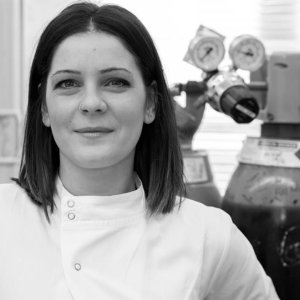Trained and HCPC registered Clinical Scientist in Microbiology, with a specialist interest in Sexually Transmitted Infections. Has been involved in various research studies including HSV, syphilis and gonorrhoea. A particular interest is antimicrobial resistance in STIs and specifically Neisseria gonorrhoeae. Received B.Sc. in Infectious Diseases from the University of East London and subsequently gained an M.Sc. in Clinical Microbiology by Queen Mary University of London and Pg.Dip. in Sexual Health by Glasgow Caledonian University. Was accepted in the competitive clinical scientist training programme with the British National Health Service and as part of this, sat the FRCPath Part 1 examination in Clinical Microbiology.
Victoria shortlists and assesses for the NHS Scientist Training Programme and part of the London Training Consortium for STP Trainees.
Is currently a member of the Association for Clinical Biochemistry and Laboratory Medicine and has held the following roles: 1) Deputy Director for Scientific Affairs, Scientific & Clinical Practice Committee, 2) Lead for Scientific & Clinical Practice, Microbiology Committee. Is a member of the Standards for microbiological Investigation Bacteriology working group and member of the Bacteriology Interest group of the British ssociation for Sexual Health & HIV.
Affiliations
Centres
Teaching
Teaching
MSc Programmes:
Medical Microbiology
Control of Infectious Diseases
MSc Modules:
Core Bacteriology & Virology
Clinical Bacteriology 1 & 2 (Deputy MO)
Clinical Virology (Deputy MO)
Mycology (Deputy DMO)
Antimicrobial Chemotherapy
She leads the Core Bacteriology module practical teaching for the MSc in Medical Microbiology and supports practical classes for clinical bacteriology, core virology, clinical virology and mycology modules. She also the deputy module organiser for the Clinical Virology, Clinical Bacteriology 1 & 2 and Mycology.
She also delivers lectures in the Core Bacteriology and Clinical Bacteriology modules. She regularly supervises MSc project students.
2013-2014: Multi-site Neisseria gonorrhoeae infection and antimicrobial resistance
2014-2015: Optimisation of broth culture for Neisseria gonorrhoeae and gene transfer from commensal Neisserias
2016-2017: Understanding the mechanism of resistance for the novel antimicrobial closthioamide in Neisseria gonorrhoeae
2018-2019: Antimicrobial susceptibility of N. gonorrhoeae strains to chlorhexidine by agar dilution and microbroth dilution method
2018-2019: Carriage and characterisation of commensal Neisseria species in the human pharynx
2019-2020: Literature Review of Viability PCR within Clinical Microbiology
2019-2020: Systematic Review of gonococcal post-cephalospirin treatment failures
2021-2022: Induction of chlorhexidine resistance in susceptible Neisseria gonorrhoeae strains
Research
Research interests: Clinical diagnostics, Antimicrobial resistance, Sexually Transmitted Infections, Neisseria gonorrhoeae, Pharyngeal gonorrhoea, AMR surveillance, Health Services Research.
Victoria’s research focuses on antimicrobial resistant gonorrhoea and how pharyngeal infection facilitates development and transmission of AMR. Specifically she is interested in the role of commensal species in the genetic transfer of AMR genes, as well as the evaluation novel treatments for gonorrhoea such as topical antiseptics.
She is now evaluating the in vitro efficacy of chlorhexidine against N. gonorrhoeae with the view to implement chlorhexidine containing solutions as gonococcal treatment, thereby improving antimicrobial stewardship.
As part of her expertise in diagnostics, antimicrobial susceptibility testing and public health, she is also interested in multi-site gonorrhoea infection and how that impacts on the above areas.
